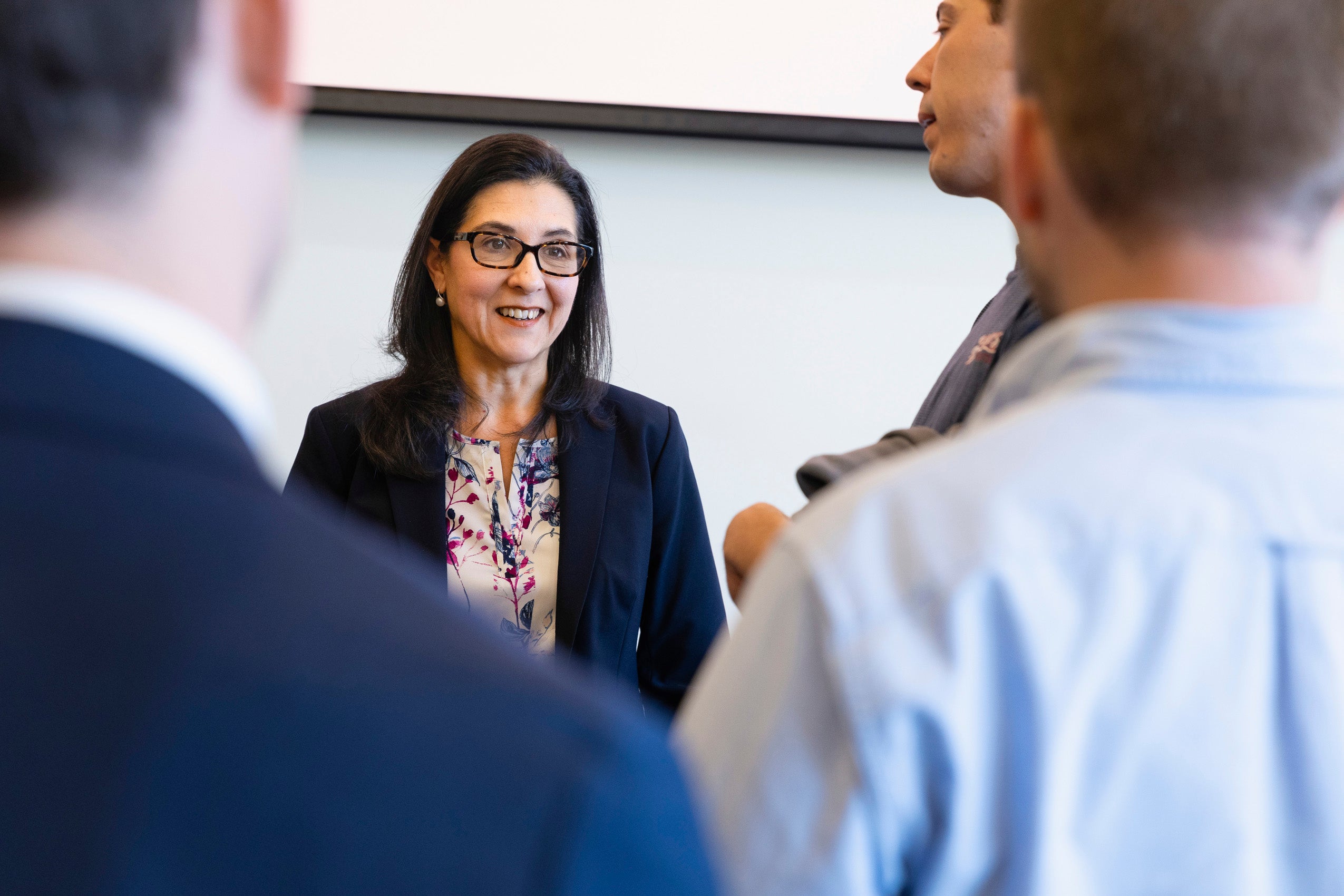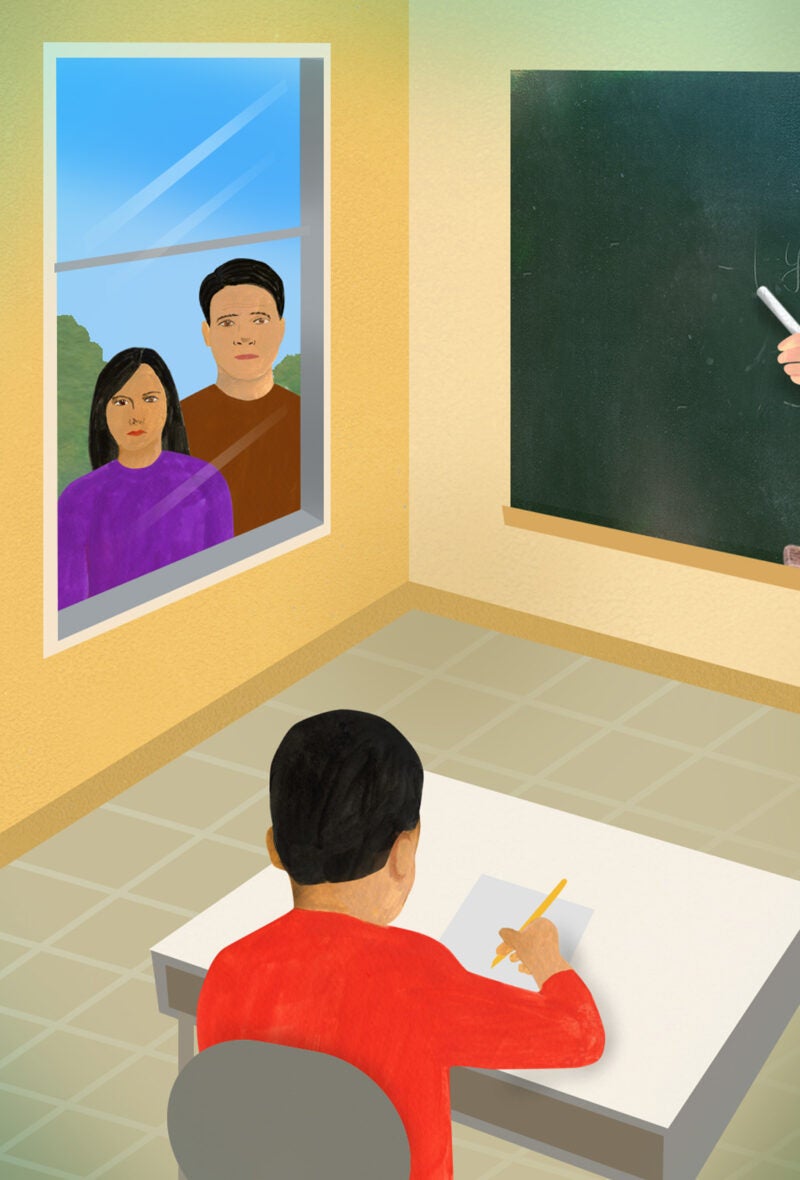Do parents have a constitutional right to direct their children’s education? Or does their authority really end at “the threshold of the school door,” as one court of appeals put it?
According to Melissa Moschella, a professor of the practice in philosophy at the University of Notre Dame’s McGrath Institute for Church Life, the answer the United States Supreme Court gave to that second question 100 years ago was a resounding “no.”
“Pierce v. Society of Sisters, following Meyer v. Nebraska, unequivocally affirmed that parents have the right to direct the upbringing and education of children under their control,” Moschella said.
Yet, despite the Supreme Court’s decisions in those cases, subsequent lower court decisions have applied these precedents too narrowly and weakly, denying parents their rightful power to set their children’s educational path, argued Moschella. She delivered her remarks last fall, which were followed by commentary from two other experts, as part of Harvard Law School’s annual Herbert W. Vaughan Memorial Lecture, introduced by HLS Professor Jack Goldsmith.
“Given the proliferation of current disputes between parents and school districts, I think the time is ripe to correct these misinterpretations of Pierce,” Moschella said. This would help make it possible for all parents, including those of limited financial means, “to fully exercise their natural and constitutional right to direct the education of their children.”
In Pierce, decided in 1925, the Court struck down as unconstitutional an Oregon law requiring all children to attend public schools. But the case is about much more than parents’ ability to send their kids to private institutions, Moschella said.

In fact, it should be read to confirm a broader constitutional right — one that recognizes the centrality of parents and guardians to their children’s instruction, she said.
As a result, Pierce should be understood as more skeptical of governmental restrictions on parental control than courts have allowed, Moschella continued. She pointed to the Pierce Court’s careful examination of the Oregon law in question. The three tiers of review typically used by courts in determining whether a law violates the Constitution were not fully established at the time of Pierce, she acknowledged, but there is evidence that the level applied by the justices a century ago would qualify as strict scrutiny today — the highest bar for a law to meet, used by courts only when a fundamental right is involved.
Later courts have failed to apply this strict scrutiny test to laws violating parents’ ability to control their children’s education, she said.
An earlier case provides further constitutional authority for parental rights, Moschella said. In Meyer v. Nebraska (1923), which struck down as unconstitutional a state law prohibiting the teaching of foreign languages, the Court, she argued, recognized that parental rights go “hand in hand” with limited government. “This connection seems obvious, for there is no surer way for would-be dictators to shape society in accordance with their own ideological vision than to have control over the education of all children.”
These two cases together, along with earlier state court cases, she concluded, provide “strong evidence that … parental rights do extend beyond the schoolhouse door and include at least parents’ right to exclude their children from certain classes, as long as this is not incompatible with the efficiency of the schools.”
Further, she added, “In my view, a full vindication of parental rights in education would also require ending the public schools’ monopoly on public educational funding, through programs that give all parents genuine school choice.”
Ultimately, argued Moschella, strong parental rights mean better protections for children. “As the common law tradition emphasized and as the U.S. Supreme Court has affirmed, parents are much more likely than the state to know what is best for their children and to be motivated to promote their children’s welfare.”
“On my view, a full vindication of parental rights in education would also require ending the public schools’ monopoly on public educational funding, through programs that give all parents genuine school choice.”
— Melissa Moshchella
‘A profoundly ambiguous opinion’
But for Anne C. Dailey ’87, a dean and professor at the University of Connecticut School of Law, Pierce is a much more complicated decision than Moschella acknowledged. “In fact, I would say that the correct reading of Pierce is that it’s a profoundly ambiguous opinion, obscure on the question of the relationship between parents and the state.”
The Court’s century-old opinion came at a time of changing norms about families and about the family unit’s relationship with the state, Dailey noted. As a result, she said, the majority is torn between the traditional view of the family as deeply connected to the state, and another “emerging liberal view of the family as separate and even opposed to the state.”
While the opinion agrees that parents play a crucial role in their children’s lives, it was “not affirming the idea that anything goes in the home,” she said. “While [Justice James Clark McReynolds] famously proclaimed that the child is not the mere creature of the state, the child was not the mere creature of the parents either.”
In Dailey’s view, Pierce contains no certitudes on whether the Constitution protects broad or narrow parental rights, “but instead opened an ongoing constitutional debate over how a modern pluralistic democracy inculcates democratic values and skills in future generations without also extinguishing the rights to freedom of thought and conscience that sustain democratic self-government.”
For Anne Dailey, the Court was “not affirming the idea that anything goes in the home.”
Moreover, parents have rights, Dailey said, but they also have responsibilities: “Duties to care for their children, to provide them with a family environment that cultivates a sense of belonging and attachment to a shared moral universe. But also, duties to ensure their children have the opportunity to develop the tools for accepting or rejecting that given moral universe as their own.”
Dailey said that her opinion is that the decision embraced a “shared role” for parents and the state “in raising democratic citizens.” Parents provide an initial moral framework and important attachments to people and beliefs, she concluded, but “a modern pluralistic liberal democracy must also insist that parents provide children with the opportunity to develop the capacities of tolerance, reason, and respect that will allow them to embrace their given worldview as their own, or if they so choose, to pursue a different way of life.”
‘Parents enjoy a prior authority to educate their children’
Erika Bachiochi, a fellow at the Ethics and Public Policy Center, which describes itself as Washington, D.C.’s “premier institute working to apply the riches of the Jewish and Christian traditions to contemporary questions of law, culture, and politics,” observed that Pierce and Meyer had, in fact, been broadly interpreted by later courts — just not when it came to cases involving parental rights, she said.
Instead, the two cases have been “interpreted with great breadth and strength to serve as key precedents for perhaps more greatly favored rights.” These include “personal liberty,” Bachiochi continued, adding that Pierce and Meyer were cited in decisions such as Griswold v. Connecticut, which struck down a law against contraceptives on the grounds of a right to marital privacy.
“We interrogate … the state’s execution of power and ask whether it is acting in harmony with the source from which it comes.”
— Erika Bachiochi
For Bachiochi, the contemporary idea that states hold the educational authority from which parents must seek a carve-out or exception, “would be foreign to the jurists who crafted Pierce and Meyer.”
“Parents enjoy a prior authority to educate their children from which flows the state’s own authority to educate children,” she insisted. “Which is why, until very recently, schools were considered ‘in loco parentis’ — in the place of parents.”
The question should not be whether parents are appropriately asserting a right, she concluded. Instead, Bachiochi suggested “we interrogate … the state’s execution of power and ask whether it is acting in harmony with the source from which it comes.”
